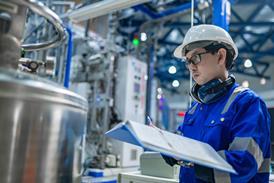- Home
- ╗╩╣┌╠ňËř╣˙╝╩ËÚ└Í
Economic Reports
The CIA gathers industry insights through a quarterly business survey to advocate for our membersÔÇ� interests with policy makers, regulators and other stakeholders.
Read more
- Our focus
Sustainable Health Metrics 2024
The CIA is proud to announce the launch of the new Sustainable Health Metrics Tool.
Read more
- The Chemical Industry
The Chemical Industry
The chemical and pharmaceutical industry is fundamental to modern society. With an immense variety of products, from vital medicines and foods, the construction of buildings, to transport and leisure, the industry truly does have an impact on virtually every aspect of our daily lives.
Read more
- Events
- News
- Become a member

Tackling Climate Change Through Chemistry
The chemical industry is at the forefront of the net zero revolution╠ř

Formula for success╠ř
The industry of industries:╠řChemical products make up over 95% of all manufactured goods - vital for food and medicines or materials for mobile phones and electric vehicle batteries to name a few.╠ř
The problem solver: Chemical sciences are key to solving the worldÔÇÖs╠řcurrent challenges.
The critical enabler:╠řWe are a staunch promoter of innovative╠řsolutions and ambitious targets to ensure net zero for all sectors.
The economic contributor: Critical to the GovernmentÔÇÖs╠řlevelling-up agenda, we have a highly skilled and wellrewarded╠řworkforce, in many pivotal locations across the╠řcountry. We provide over 500k jobs, adding more than ┬ú18bn╠řof value to the UK economy.
Delivering the solutions╠ř
What we need from government╠ř
Design a long-term, joined-up net zero policy framework
Carbon pricing is effective when it creates certainty for investors╠řthat new technologies will yield a return. This requires clear,╠řconsistent, long-term policies, a predictable price signal, support╠řfor innovative clean technologies and most importantly, a╠řlevel playing field with competitors internationally.
Empower energy and resource efficiency
Continuously improving the efficient use of╠řenergy and materials is a critical driver in the╠řcreation of a net zero and circular economy,╠řwith investments helping support the╠řtransition.
Protect industry through its transition
Effective, long-term and predictable carbon╠řleakage protection will be fundamental, as UK╠řbusinesses adopt manufacturing methods that╠řcome with a ÔÇśgreen premiumÔÇ�. Essential elements╠řinclude minimising non-wholesale energy costs and a╠řlevel-playing field on carbon pricing.
Build a world-leading net zero energy system
Access to secure, reliable and competitively priced sources of zero╠řcarbon energy to allow UK manufacturers to switch to clean fuels,╠řthe roll-out of clean electricity coupled with investible hydrogen and╠řcarbon capture and storage business mode will be key.
Lay foundations for new circular economy
Reliable access to sustainable raw materials╠řthat will form the basis of a new circular╠řeconomy, are essential to enable the sector╠řto develop the advanced materials needed╠řfor a climate friendly world.
Simplify the policy mix
There has been a proliferation of industrial╠řenergy and climate change policy over╠řtime. Multiple overlapping policies complicate╠řand undermine investment decision-making╠řand can create perverse incentives.╠řStreamlining these schemes will support the UKÔÇÖs╠řdecarbonisation, making it simpler for businesses to invest in╠řthe UK.
Case Studies
The Hydrogen Climate Solution - Johnson Matthey╠ř
How are we achieving net-zero?
The HyNet project is paving the way for a net zero economy by╠řdeveloping the UKÔÇÖs first low carbon hydrogen plant. The facility╠řwill produce 80kt of hydrogen per year, and capture 600,000╠řtonnes of COÔé� ÔÇ� the equivalent of taking over 250,000 petrol or╠řdiesel powered cars off the road.
How are we improving everyday lives?
HyNet will meet the major challenge of reducing carbon dioxide╠řmissions, providing low carbon power for industry, transport and╠řlow carbon heating for our homes and businesses.
Bringing sustainable fashion to life - Dow
How are we achieving net-zero?
Dow is helping bring sustainable fashion to life without sacrificing╠řcolour or quality. DowÔÇÖs treatment process uses 90% less process╠řchemicals and therefore a 60% lower carbon footprint. Plus, itÔÇÖs╠řhelping the planet, using 50% less water and up to 40% less╠řenergy.
How are we improving everyday lives?
DowÔÇÖs sustainability mission has a focus to lessen the strain on╠řour precious water resources.
Enabling CO2 savings for cars and aircraft - Victrex
How are we achieving net-zero?
Annual CO2 savings of over 80,000 tonnes in European cars andcnearly 100,000 tonnes in global aerospace are being saved thankscto light-weight, long-lasting and sustainable polymers. Weightsavingchelps to reduce fuel use and consequently improves CO2 emissions across major fleets of aircraft.
How are we improving╠řeveryday lives?
Looking to make more╠řsustainable aircraft over the╠řlong-term, making it faster,╠řlighter and cheaper.
╠ř
╠ř
UKÔÇÖs largest Carbon Capture╠řand Utilisation Plant - TATA
How are we achieving net-zero?
Tata Chemicals Europe has invested ┬ú20m in building of UKÔÇÖs╠řlargest Carbon Capture and Utilisation Plant in Northwich,╠řreducing its emissions by 11% and enabling net zero╠řmanufacturing of one of its key products, sodium bicarbonate.
How are we improving everyday╠řlives?
Exported to over 60 countries╠řglobally, sodium bicarbonate is╠řused in many everyday╠řproducts in from╠řpharmaceuticals, cooking,╠řto fire extinguishers, personal╠řcare and many others.
╠ř
╠ř
╠ř
╠ř
╠ř
More facts
- The chemical industry is committed to delivering more sustainable╠řsolutions for a cleaner, greener society.
- We are an essential enabler and driver of net zero for all sectors, especially automotive,╠řtransportation and pharmaceuticals.
- Not only are chemicals essential components to energy-saving products but cutting emissions and╠řtransforming chemical production have a huge impact globally and can transform╠řthe world around us.
- We have an important role to play in moving to low-carbon╠řeconomies ÔÇ� providing coatings for solar panels, lightweight╠řplastics to reduce vehiclesÔÇ� energy consumption and╠řinsulating materials for buildings.
- It is through our industryÔÇÖs innovation and technology╠řthat will allow other companies and sectors to╠řdecarbonise, deliver the UKÔÇÖs net zero ambitions and╠řultimately, combat climate change.









